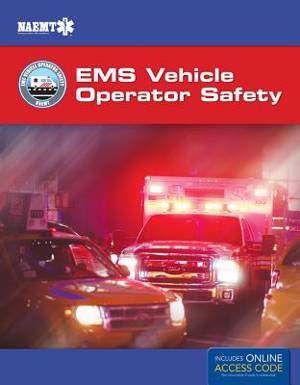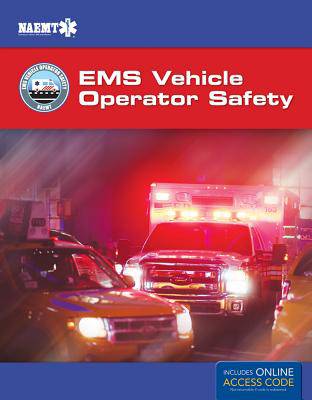
- Retrait gratuit dans votre magasin Club
- 7.000.000 titres dans notre catalogue
- Payer en toute sécurité
- Toujours un magasin près de chez vous
- Retrait gratuit dans votre magasin Club
- 7.000.0000 titres dans notre catalogue
- Payer en toute sécurité
- Toujours un magasin près de chez vous
Evos: EMS Vehicle Operator Safety
Includes eBook with Interactive Tools
Bob Elling, Robert Raheb, National Association of Emergency Medical Technicians (Naemt)
Livre broché | Anglais
34,95 €
+ 69 points
Description
Every year, thousands of emergency medical services (EMS) vehicle collisions cause significant property damage, injury, and death--underscoring the need for dedicated EMS vehicle operator training. To meet this need, the Jones & Bartlett Learning Public Safety Group partnered with the National Association of Emergency Medical Technicians (NAEMT) to develop a comprehensive course for EMS practitioners who operate ambulances and other emergency response vehicles. EMS Vehicle Operator Safety (EVOS) addresses the vehicle operations and transport safety knowledge gaps that lead to injury and death. Built on current research and featuring discussions of actual crashes and common driving scenarios--and the lessons that can be learned from them-- it challenges emergency vehicle operators to consider if they truly know how to arrive at a scene safely. The course manual profiles real-life incidents and provides practical safety pointers, emphasizing the critical safety principles that are needed to transform a culture of dangerous driving habits into a culture of safety. Promoting a Culture of Safety EMS Vehicle Operator Safety trains EMS providers to recognize the specific behaviors that must be changed in order to promote a culture of safe driving. Participants are taught to identify and remove hazards that lead to vehicle collisions, from sleep deprivation to technological distractions to alcohol and substance use. Participants learn practical strategies to reduce the risk of a collision, from defensive driving to vehicle positioning to use of lights and siren. The course also underscores the significance of local laws and regulations that govern EMS vehicle operation, and how standard operating procedures (SOPs) are central to shaping safe driver behavior. The program addresses: Developing a safety-first attitude to ensure the emergency vehicle operator's own safety and the safety of his or her partner, the patient, and any passengers Distinguishing the types of laws that affect EMS vehicle operation, including considerations for responding to emergency and non-emergency calls Taking appropriate precautions when performing specific vehicle maneuvers and when driving under various road and weather conditions Performing daily vehicle inspections to manage mechanical issues Practicing mental, emotional, and physical preparedness Responding appropriately and safely to emergency responses Proactively avoiding vehicle crashes and how to respond if one occurs Developing spatial awareness and practicing skill maneuvers in a driving skills course Evaluating new and future developments in EMS technology Utilizing simulation training to integrate knowledge learned during lectures with the technical abilities and judgment acquired through skills practice Developing effective agency SOPs for key aspects of EMS vehicle operation
Spécifications
Parties prenantes
- Auteur(s) :
- Editeur:
Contenu
- Nombre de pages :
- 134
- Langue:
- Anglais
Caractéristiques
- EAN:
- 9780763781675
- Date de parution :
- 17-10-16
- Format:
- Livre broché
- Format numérique:
- Trade paperback (VS)
- Dimensions :
- 153 mm x 229 mm
- Poids :
- 283 g

Les avis
Nous publions uniquement les avis qui respectent les conditions requises. Consultez nos conditions pour les avis.






